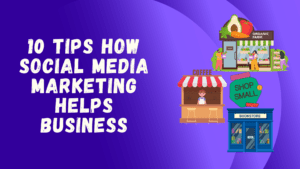
Social media marketing can be a powerful tool for businesses, offering a wide range of benefits that contribute to their overall success. Here are several ways in which social media marketing can help businesses:
1. Increased brand awareness: (10 Unique Ways Social Media Marketing Helps Business)

Social media platforms provide extensive reach to a global audience. By creating and sharing engaging content, businesses can increase their brand visibility and reach a larger number of potential customers.
Increased brand awareness is crucial for businesses as it helps audiences understand, recall, and become comfortable with your branding and products, ultimately leading to higher sales and customer loyalty. Here are some strategies to increase brand awareness:
- Prioritise consistency: Ensure that your brand’s presentation is consistent across all platforms and channels to create a cohesive brand image.
- Be about more than just your products: Focus on building relationships with your audience by providing value beyond your products or services, such as informative content, education, or entertainment.
- Give back: Engage with your community and demonstrate your commitment to social and environmental causes to create a positive brand image.
- Think omnichannel: Use multiple channels to communicate with your audience, such as social media, email, and content marketing, to increase your brand’s visibility and reach.
- Create a recognisable brand: Develop a clear brand identity, including a distinct voice, logo, and messaging, that resonates with your target audience.
- Leverage social media: Post on social media platforms about topics unrelated to your products or services to engage with your audience and increase brand visibility.
- Tell a narrative: Share your brand’s story and values through various channels, such as blogs, podcasts, or videos, to create an emotional connection with your audience.
- Make sharing easy. Encourage your audience to share your content by providing easy-to-use sharing buttons and incentives for user-generated content.
- Disrupt the market: Stand out from competitors by being different and memorable, track their strategies, and curate campaigns that boost brand awareness.
Remember that building brand awareness is an ongoing process that requires consistent effort and engagement with your audience. By implementing these strategies, you can increase your brand’s visibility, trust, and ultimately, its success.
2. Targeted advertising:

Social media platforms offer advanced targeting options that allow businesses to tailor their advertising to specific demographics, interests, and behaviors. This ensures that marketing efforts are focused on reaching the most relevant audience.
Targeted advertising, also known as ad targeting, is a method of displaying advertisements to a specific group of people based on their demographics, behavior, interests, or other criteria. It is a form of online advertising that focuses on the specific traits, interests, and preferences of a consumer. The primary goal of targeted advertising is to ensure that ad content reaches individuals most likely to resonate with the content, ultimately leading to higher engagement and conversion rates.
The process of targeted advertising involves several key steps:
- Data collection: Gather data about users, including browsing history, purchases, and social media interactions, through their online activities.
- User profiling: Create customer profiles based on demographics, online behavior, interests, and other factors to categorize individuals.
- Ad delivery: Use the collected data to serve ads to users based on their profiles, ensuring that advertisements are relevant to their interests and preferences.
The benefits of targeted advertising include:
Efficiency: Targeted advertising allows businesses to focus their resources on the most rewarding audience groups, reducing spending on less effective channels.
Personalization: Research shows that 71% of customers prefer personalized advertisements, and personalization in digital marketing can boost revenue by 15%.
Repeat purchases: Personalized ads encourage repeat purchases, with 44% of customers becoming repeat buyers when ad personalization is involved.
Some examples of targeted advertising include:
The New York Times ad targets a specific audience segment, such as those in their 20s, and offers content relevant to their interests.
Peloton’s ad campaign aims to capture and convert a historically hesitant section of its audience by giving them a sense of belonging and offering targeted content.
Nom Nom’s ad targets high-spending pet owners and incorporates a customer testimonial to convince viewers that the product is worth clicking on.
However, targeted advertising can also be seen as an invasion of privacy, as advertisers can track various aspects of consumers’ online activities, such as search engine requests, social media updates, and websites visited. Despite these concerns, targeted advertising continues to evolve and adapt to the changing tastes and habits of consumers.
3. Improved Customer Engagement:

Social media enables businesses to engage directly with their audience. Responding to comments, messages, and mentions fosters a sense of community and builds trust with customers. It also provides an avenue for immediate feedback, allowing businesses to understand their customers’ needs and preferences.
Businesses can use a variety of tactics to promote customer engagement by fortifying their customer relationships and elevating the whole customer experience. Several tried-and-true methods for engaging customers are:
- Building a Better Client Experience: Concentrating on offering a smooth and customized experience throughout all client contact points.
- Effective Ways to Connect: Using chatbots, omnichannel experiences, and conversational marketing to communicate with customers across various channels.
- Emphasizing Retention: To develop a base of devoted customers, put in place customer loyalty programs and actively listen to and act upon customer feedback.
- Personalising Services: Utilising client information to provide tailored experiences, including suggesting products based on past purchases.
- Truly Involving Customers with Meaningful Messaging: To establish individualised and beneficial connections with customers, provide helpful information, communicate the company’s story, mission, and vision, and launch a customer loyalty program.
Businesses may improve conversions, foster client loyalty, and retain more customers by implementing these tactics.
4. Cost-Effective Marketing:

Compared to traditional advertising methods, social media marketing can be more cost-effective. Many social media platforms offer both organic (free) and paid advertising options, allowing businesses to choose the approach that fits their budget.
Businesses can advertise their goods and services without going over budget by using cost-effective marketing techniques. Here are a few tried-and-true low-cost marketing techniques:
- Referral Programmes: By providing rewards like discounts or free merchandise, you can persuade clients to recommend you to their friends and family.
- Social Media Marketing: Connect with consumers on social media, share content, and advertise your brand.
- Information marketing: To draw in and keep viewers interested, provide insightful and useful information like blog entries, videos, or infographics.
- Email Marketing: Send targeted messages to customers via email campaigns, such as newsletters, promotions, or updates on new products.
- Collaborations: To increase your reach and market your brand, collaborate with influencers or other companies.
5. Drive website traffic:

Social media serves as a valuable channel for directing traffic to a business’s website. By sharing links to products, blog posts, or other content, businesses can generate leads and conversions.
There are several ways to increase website traffic, and they can be divided into two categories: free and paid approaches. The following are some practical strategies to boost website traffic:
- Internet directory listings: To improve the exposure of your website, get listed in pertinent internet directories.
- On-page SEO: Use keywords to enhance your content and raise your website’s search engine ranking.
- Off-page SEO: Increase the domain authority of your website by constructing backlinks.
- Social media: Use hashtags and interesting material to get more exposure on social media platforms.
- Landing pages: Make customized landing pages for particular campaigns or audiences.
- Email marketing: Promote your website and increase visitors with email campaigns.
- Guest blogging: To increase visibility and traffic, write articles for other websites in your niche.
- Giveaways and contests: Plan giveaways or contests to draw in new visitors.
- Educational content: To draw in readers, produce informative content like posts, certificates, or courses.
- Repurpose content: To increase traffic, repurpose already existing content—like blog posts or videos—into new formats, such as articles or videos.
- SEO tools: Evaluate the effectiveness of your website and create a traffic-generating plan using tools such as Ahrefs, SEMrush, and Google Analytics.
- Paid advertising: To increase traffic to your website, spend money on online advertisements on sites like Reddit, TikTok, Google, and Quora.
Recall that boosting website traffic requires work, patience, and occasionally cash. You can increase the exposure of your website, draw more visitors, and eventually expand your business by putting these methods into practice.
6. Enhanced SEO (Search Engine Optimization):

Social media signals can positively impact a website’s search engine ranking. Active engagement and sharing of content on social media can contribute to increased visibility and traffic, which can, in turn, improve search engine rankings.
Enhanced SEO (Search Engine Optimization) for small businesses can be achieved by implementing the following strategies:
- Find the right keywords: Use keyword research tools like Google Ads Keyword Tool or SEMrush to identify relevant keywords for your business.
- Focus on unique offerings: Highlight your unique products or services to differentiate yourself from competitors.
- Optimise your website: Use on-page SEO techniques to improve your site’s content, titles, and descriptions.
- Build high-quality backlinks: Acquire relevant backlinks from reputable websites to improve your site’s domain authority.
- Create compelling content: Produce engaging content, such as articles, videos, and images, to attract and retain visitors.
- Update your content regularly: Keep your content fresh and relevant to maintain its value and effectiveness.
- Leverage social media: Promote your website and content on social media platforms to increase visibility and engagement.
- Improve technical SEO: Fix any technical issues on your website, such as broken links or poor site navigation, to enhance the user experience.
- Use SEO tools: Utilize SEO tools like Google Analytics, Ahrefs, and SEMrush to analyze your site’s performance and develop a strategy to improve rankings.
- Optimize for local search: Ensure your website is optimized for local searches by embedding Google Maps and including local keywords.
By implementing these strategies, small businesses can improve their search engine rankings, increase website traffic, and generate more leads and sales.
7. Market Research:

Social media platforms provide businesses with insights into customer behavior, preferences, and trends. By monitoring social media activity, businesses can gather valuable data to inform their marketing strategies and product development.
Take into consideration the following reasonably priced and efficient methods for conducting improved market research for a small business:
- Make use of internet platforms: Interact with possible clients and obtain information from sites such as Facebook groups, Quora, and Reddit.
- Conduct surveys: Make surveys and send them out to receive insightful input from your intended audience.
- Analyse book reviews: Look through reviews of books in your business to learn about the preferences and problems of your customers.
- Make use of current resources: To learn more about market trends, demographics, and consumer behaviour, use free statistics and data from dependable sources.
- Competitor analysis: Research your rivals to find advantages in the market and comprehend customer preferences.
- Insider sources of information: Analyse internal resources to obtain important business information, such as sales and customer service data.
Through the use of these strategies, small firms can learn more about their target market, customer behaviour, and industry trends, which can help them make more strategic decisions and expand their operations.
8. Competitive Advantage:

Establishing a strong presence on social media can give businesses a competitive edge. It allows them to showcase their unique selling points, share success stories, and differentiate themselves from competitors.
Small businesses can gain a competitive advantage by utilising a variety of methods that capitalise on their distinct strengths and skills. The following are some of the main ways that small firms compete:
- Niching and differentiation: To differentiate themselves from rivals, small enterprises can concentrate on niche markets and provide distinctive goods or services.
- Quicker decision-making: Smaller organisations can react to market developments and make decisions faster than larger ones.
- Personalised customer service: One of the main ways that small businesses may set themselves apart from larger corporations is by offering customised and excellent customer service.
- Empowered and developed team: Small companies can cultivate a close-knit group of individuals who are more invested in and dedicated to the company.
- Access to leaders: Employees in small businesses have direct access to owners or leaders, which facilitates quicker problem-solving and better decision-making.
- Local focus: Small companies can put a high priority on their neighbourhood and cultivate enduring ties with nearby clients and vendors.
- Innovation: Due to their lower bureaucracy and greater drive for success, small enterprises are often more adaptable and creative.
- Specialization: Small enterprises can develop into authorities in their industry and draw a devoted clientele by concentrating on a particular sector or niche.
- Switch swiftly and effectively: Smaller organisations are more able to quickly adjust to shifts in the market and client preferences than larger ones.
- Effective cost management: Due to their lower operating expenses, small businesses are generally able to make larger investments in their goods and services.
Small businesses can outmaneuver larger enterprises and prosper in their respective sectors by utilising these competitive advantages.
9. Build Brand Loyalty:

Regular interaction with customers on social media helps build brand loyalty. By consistently delivering valuable content, responding promptly to inquiries, and showcasing the human side of the business, companies can create lasting connections with their audience.
Small businesses can develop brand loyalty by implementing a range of methods that centre around delivering value, customising experiences, and cultivating customer relationships. The following are some efficient strategies for small firms to develop brand loyalty:
- Make great customer service a priority: Provide outstanding customer service to foster good experiences and promote client loyalty.
- Construct useful web resources: To inform and interest your audience, provide informative and entertaining content, such as blog entries, videos, or infographics.
- Create an unforgettable first impression: Make sure that consumers remember their initial encounter with your brand.
- Maintain a dedication to ethical business practices: To draw in ecologically sensitive clients, exhibit your dedication to social and environmental responsibility.
- Offer regular discounts: Give clients exclusive deals and discounts to promote recurring business and foster goodwill.
- Establish a customer loyalty program: Create a programme that offers benefits to clients for their ongoing business, building enduring connections.
- Customer experience personalization: Make consumers feel valued and appreciated by using customer data to customise communications and experiences.
- Make use of social media: Interact with consumers on social media sites to forge connections, distribute insightful material, and highlight the individuality of your brand.
- Hold special events: To foster a sense of community and fortify relationships, plan activities just for devoted patrons.
- Provide personalized touchpoints: To help clients feel valued and special, provide personalised interactions like product recommendations or personalised emails.
- Ensure continuing loyalty initiatives: Put in place initiatives that thank clients for their continued support, like providing special privileges or advantages.
- Provide customised experiences: Create experiences that are specifically tailored to the tastes and requirements of your clients to help them feel heard and appreciated.
Small firms can increase their market share, retain consumers, and foster brand loyalty by putting these tactics into practice.
10. Crisis Management:

In the event of a crisis or negative publicity, social media provides a platform for businesses to address issues directly, share their perspective, and manage their online reputation effectively.
In summary, social media marketing plays a crucial role in modern business strategies by offering a dynamic and influential platform for brand promotion, customer engagement, and overall business growth.
Crisis management for small businesses through social media marketing involves being prepared for unexpected situations and using social media platforms to address issues promptly and effectively. Here are some strategies for managing crises using social media marketing:
- Develop a social media crisis communication plan: Create a comprehensive plan outlining roles, responsibilities, and steps to follow during a crisis.
- Monitor social media proactively: Keep an eye on your brand’s social media accounts and mentions to detect early warning signs of a crisis.
- Respond quickly and effectively: When a crisis occurs, act promptly to address concerns and provide accurate information to maintain trust and credibility.
- Create content that speaks to customers’ needs: Develop content that addresses customers’ concerns and provides valuable information during a crisis.
- Prepare an evergreen crisis communications plan: Ensure you have a plan in place for any potential crisis, whether it’s specific to your brand or a global event.
- Set up your social media operations: Make sure your team has access to the necessary tools and resources to manage social media during a crisis scenario.
- Use social media to provide actionable recommendations: Leverage social media platforms to share updates, recommendations, and guidance on business next steps.
- Lead with empathy and flexibility: Be compassionate and adaptable when addressing issues on social media, as this approach helps build trust and credibility with your audience.
- Collaborate across functions: Work closely with your team to bring the best outcome forward and provide accurate information on the situation.
- Address misinformation: Provide information and updates on the situation to stop misinformation from spreading and causing further damage to your brand’s reputation.
By implementing these strategies, small businesses can effectively manage crises using social media marketing, minimizing the impact on their operations and reputation.
In conclusion, the importance of social media marketing for businesses cannot be emphasised. The 10 Unique Ways Social Media Marketing Helps Business that were covered show the various ways that utilising social media platforms can greatly enhance a company’s entire marketing plan. Social media marketing is a powerful tool that businesses of all sizes can use to drive website traffic, build meaningful connections, and improve brand visibility and customer engagement. Businesses can reach a large and worldwide audience by adhering to the constantly changing social media landscape, putting strategic content plans into action, and actively participating in online discussions. Social media’s power comes from its capacity to forge genuine connections with consumers, in addition to its ability to spread information.







